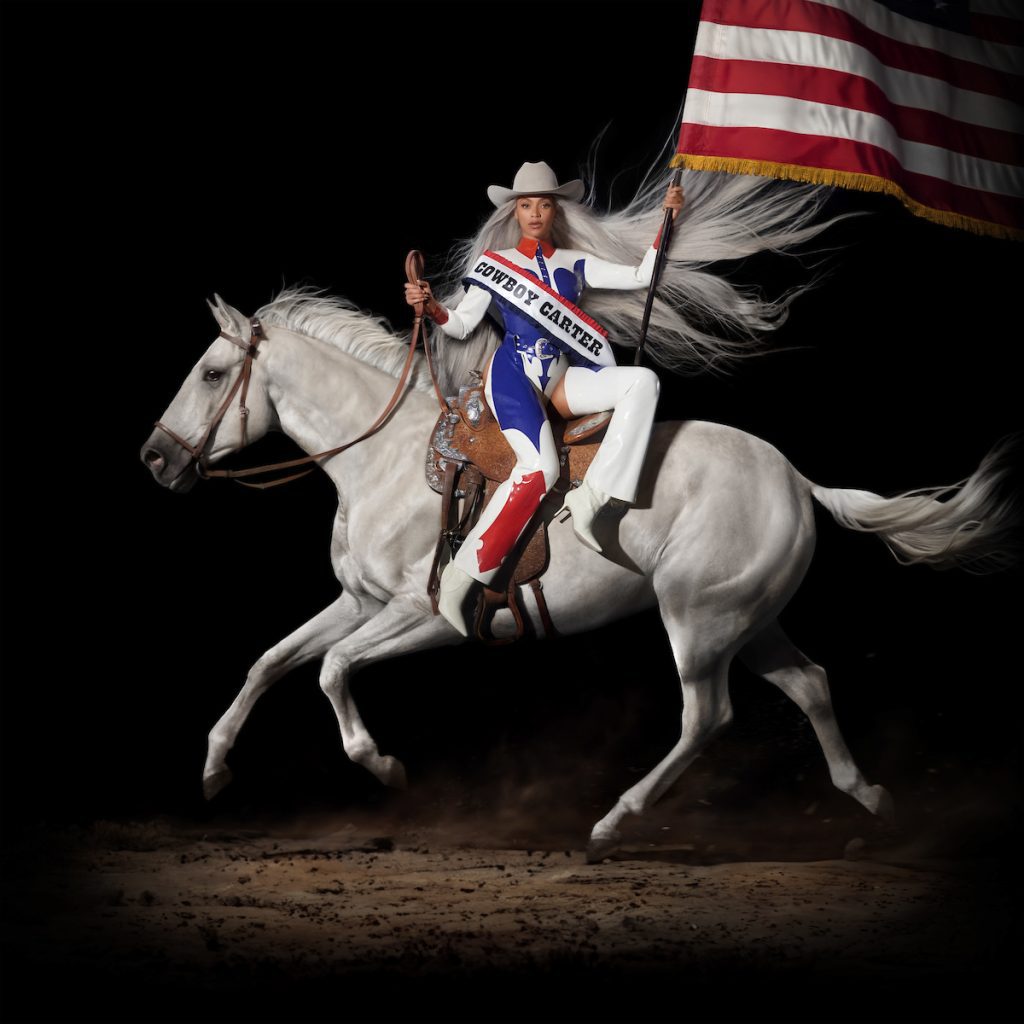ALBUM REVIEW: On ‘Cowboy Carter,’ Beyoncé Mines Tradition and Carves Out a Canon of Her Own

With her new album, Cowboy Carter, Beyoncé forges an expansive take on the traditional canon, integrating a broad swathe of American music, including country, blues, R&B, rock, and gospel. While 2022’s Renaissance spotlighted her as a global MC throwing the party of the decade, Cowboy Carter, framed as Renaissance’s Act II, paints her as a torchbearer and synthesist, an auteur equally adept at playing the archivist and the cultural midwife.
“Protector,” for example, is a gospel-indebted manifesto, Beyoncé speaking into the power of the maternal instinct as she demonstrates her vocal range. “16 Carriages,” an origin story dramatized by biblical imagery, combines rock beats and bluesy instrumentation. “Ameriican Requiem” is catchy country-pop soaked in a Southern-goth haze, the track roiling with percussive and synthy accents.
“Smoke Hour ★ Willie Nelson” launches with samples from Chuck Berry’s “Maybellene,” Roy Hamilton’s “Don’t Let Go,” Rosetta Tharpe’s “Down by the River Side,” and a spoken-word interlude by Nelson himself. In this way, Beyoncé aligns herself with diverse predecessors, strategically placing her own music squarely within a traditional body of work. “Smoke Hour” segues into “Texas Hold ’Em,” featuring Rhiannon Giddens on banjo and viola. We’ve heard these melodies, rhythms, and harmonies before, but Beyoncé’s interpretation seems fresh, decisive, the singer borrowing from and reconfiguring perennial templates, successfully claiming them as her own.
This ability to draw from essential sources while paradoxically transcending their influence is at the heart of Cowboy Carter’s success. “Bodyguard” is a pop jewel that wouldn’t be out of a place on a sports-bar jukebox, a beach-themed radio station, or a TikTok trend. Beyoncé’s larger-than-life presence and dynamic vocals, however, render the song entirely hers. “Just for Fun” fuses folk rhythms and classical accents, a lagging acoustic guitar creating a narcotized, semi-psychedelic effect. “Aliigator Tears” features languid beats and acoustic strums, melding country timbres and dreampop atmospherics. On the irresistible “II Most Wanted,” Miley Cyrus contributes a stellar guest performance. Her voice blends sublimely with Beyoncé’s, the two singers conjuring a magical road trip, describing how it feels to transcend space and time (at least briefly).
The project includes several notable covers. “Blackbiird” occurs as a somewhat random exercise, the kind of harmony-filled version that a talented choir might undertake. (In this case, the choir is Beyoncé, Tanner Adell, Brittney Spencer, Tiera Kennedy, and Reyna Roberts.) With “Jolene,” introduced by “Dolly P” herself and built around a driving stomp-beat, Beyoncé revises the original’s pleading stance, adopting combative lyrics and a hawkish tone. “Ya Ya” heavily references Nancy Sinatra’s “These Boots Are Made for Walkin’,” a riveting amalgam of gospel, blues, and psychedelia undergirding Beyoncé’s adrenalized vocal.
“Riiverdance” pairs bluegrass-inflected guitar-picking and Irish dance vibes with a mysterious tale about a woman who was killed and brought back to life. The opening section of “II Hands II Heaven,” bolstered by a synthy drone and digital beat, evokes a sense of being existentially lost (“I’m a stallion running / no candle in the wind”). The second section gradually shifts into expressions of romantic gratitude (“I’m gonna give you the best years of your life”), the beats busier, the vocals more thickly layered. Beyoncé aptly ends the set with “Amen,” dipping into the heated debate about how history should be represented (“The statues they made were beautiful / but they were lies of stone”) while stressing the ongoing need for freedom work (“We’ll be the ones to purify our fathers’ sins”). Finally, she calls repeatedly for “mercy.”
With Renaissance, Beyoncé hosted a come-one-come-all summer soiree, basking in a post-COVID playlist. Cowboy Carter, in turn, shows her more singularly committed to desegregating American music. Tradition, she contends, belongs to everyone. Genre should be democratized, not tyrannized; eclecticized, not homogenized. With Cowboy Carter, Beyoncé continues to reinvent herself, casting a wide aesthetic net, again asserting a signature mix of craft, vision, and theatricality.
Beyoncé’s Cowboy Carter was released on March 29 via Parkwood Entertainment and Columbia Records.



